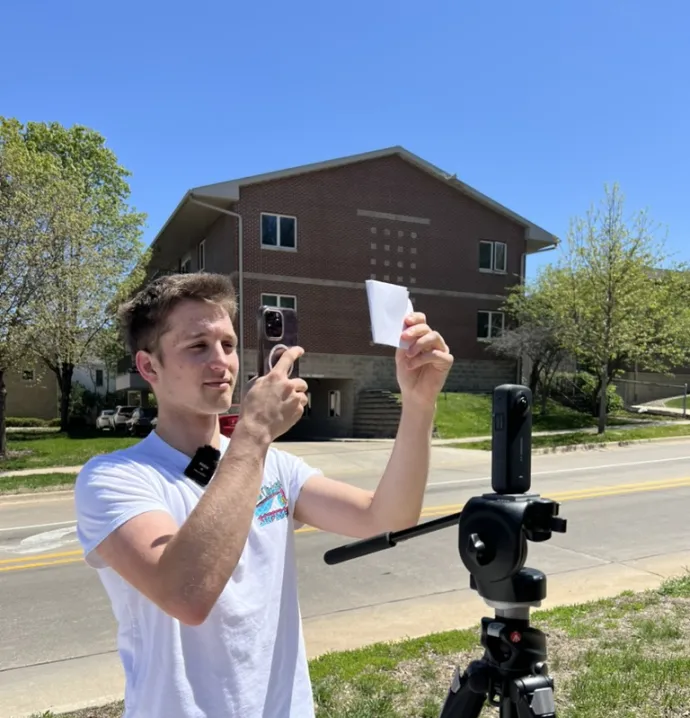Campus community adjusts to life online
Campus community adjusts to life online
When about a dozen students in University of Northern Iowa professor Justin Holmes’ political science senior seminar joined their first online class last week, they couldn’t help but smile.
Holmes greeted them before a Zoom background of a famous meme - a cartoon of a dog sitting down to a cup of coffee in a room engulfed with flames. The thought bubble reads “This is fine.”
“It was a way to inject a bit of humor,” said Holmes, who uses a different Zoom background each day - like the Millennium Falcon cockpit - to help launch class discussion. “This situation seems to especially fit - everything goes on as normal, but everything is different.”
In the wake of a global coronavirus pandemic, those differences are profound for both faculty and students. Professors were given the Herculean task of suddenly shifting their classroom teaching online mid-semester. Students faced monumental challenges of their own in the online transition - their campus and social lives were upended, some lost their jobs or had parents who did and some had to leave their dorms and move home on short notice. A few experienced all three at once.
Interviews with numerous faculty and students last week provided a glimpse of how the transition to remote learning went - it wasn’t perfect, but it’s working. Everyone interviewed said they’re adjusting and looking forward to when campus life resumes.
“I’ve been trucking ahead,” said James Mons, a freshman UNI music major. “I miss my UNI family a lot, and I’m eager for all this to pass, but we push on despite these circumstances.”
Professors praised students' ability to weather the storm and their colleagues' ingenuity at teaching subjects like music that don’t lend themselves easily to an online-only format.
“The students have been amazing and are just rolling with it,” said family studies professor Bill Henninger.
Henninger said it hasn’t been easy making the leap to online-only, but it’s making him more versatile and recording the lectures will help students later who have to miss class. “It’s forcing me to do something different that’s a little uncomfortable...but I think that’s going to make me a little better instructor.”
Henninger is married to gerontology professor Elaine Eshbaugh, so the two have had to set up separate workspaces in their Cedar Falls home. Eshbaugh works from a basement office while her husband uses a spare bedroom or his campus office. “I didn’t want to be on an advising call and have my husband walk to the shower behind me,” Eshbaugh joked.
Like many faculty and students, the couple said keeping a daily routine going has been essential to successfully working from home. UNI women’s and gender studies graduate student Phales Milimo said it’s been crucial for her as well.
“The thing that’s keeping me going is knowing that school is still very much in session, and therefore I have to keep giving it the seriousness it deserves just like I would if I was going to class,” Milimo said. “I’m doing this by waking up early even on days I don’t have classes and creating an environment where I can read for my classes and get my papers done.”
Some professors were faced with an almost impossible task - taking the world of art or music or theatre and translating it through a computer screen.
At the UNI School of Music, professors are dealing with the challenges of virtual music lessons. UNI associate professor Amanda McCandless taught clarinet lessons for 17 hours last week through Zoom and found the experience depended on the students’ internet connection and audio equipment.
“I can hear whether they are playing the correct notes and rhythms, but I can't hear nuances in their sounds very well,” McCandless said. “What I am doing with every student is a blend of Zoom instruction, where I can hear the portions of their lesson that seem to be effective over Zoom in real time, and correspondence-style teaching where students make videos of themselves using their phones or iPads and share them with me.”
She said the transition has been a challenge for faculty and students alike, as they adjust to new routines and teaching methods.
“The thing I'm confident about is that UNI has fantastic students who will do their best to keep learning and cooperate as much as they can,” McCandless said. “And we also have smart faculty who want to make this work as well. Now we'll get new routines set up, try to follow them and deal with what comes at us when it does.”
Art Professor Timothy Dooley was confronted with the problem of how to bring the experience of working in his printmaking studio, which is filled with bulky equipment like a four foot by eight foot relief press, into students’ homes.
“When you’re teaching something hands on and your hands need to be off, that’s pretty challenging,” Dooley said.
To create their own projects, Dooley offered various options. Students can complete their work in a digital environment using apps and Adobe software. For those with access to the materials, Dooley is instructing them how to cut out stencils from cereal boxes and use spray paint to create multi-layered prints. Some students are learning Japanese hand printing techniques that are hundreds of years old.
Other professors, such as mathematics professor Doug Shaw, were teaching technical courses where every aspect of the subject was vital.
“I don’t get to cut stuff out of technical calculus,” Shaw said. “It’s a course for industrial tech majors. They’re going to be using this in their work, so that’s a different kind of challenge. I wanted the students to feel that they were still getting their money’s worth.”
Shaw was also mindful that his students were going through trying circumstances of their own.
“Some of them are now unemployed, they lost their jobs,” Shaw said. “So, some of them are dealing with financial hardship. Some of them are going to be dealing with sick relatives. And then some of them just want stuff to do. So I had to design a course that made compromises just to make sure that all the students could take it.”
Shaw, like many other professors, ended up using the app Zoom to give lectures and communicate with students. It creates a different feel from the typical in-person classroom experience, but art instructor Aypryl Thompson is finding the process deepens her relationship with students in her Visual Perceptions class.
“My students get to see my house and my dog and hear the dog barking in the background. I’ve embraced those things,” Thompson said. “It shows them how real I am, and we’re not just these people that stand in front of the room and spew a bunch of information at them. It brings us closer together as humans.”
One of the main concerns about online learning is that it lessens the amount of interaction that is typical in a classroom. But online teaching veteran Julianne Gassman, an associate professor in the department of health, recreation and community services, said that is not the case.
“One of the misconceptions about online education is that it's one-way, and you don’t build that relationship. I have found that not to be true,” Gassman said. “I think that the online space does allow for relationship building.”
She said one of the keys to successful online instruction is to encourage participation in the discussion board.
“When I do discussion boards, everyone has to make an initial post and engage with at least two other students,” Gassman said. “What I find is that more students are included in that sort of discussion than you might find in the classroom. I get much more full participation.”
Other professors are trying to decide whether to hold live lectures or record them to post online, so students can watch them on their own schedule. Finance instructor Steve Yerkes said he might do both.
“That way, the students that want to interact can watch live and the ones that maybe it's bad timing, because they're at home or they're working or something else, can do it after the fact,” Yerkes said. “I think offering multiple versions is going to be the way that we can help the students the most.”
The professors’ efforts are paying off. Senior leisure, youth and human services major Piper Fox said her new online courses feel different from online courses taken in the past.
“These online classes are completely different,” Fox said. “I feel it’s because the professor's still want us engaged, and they want to talk to us, and they want it more than just like any other online class. They want us to still be able to get the experience as if we were taking the actual class.”
Gassman said it was important for students to give themselves a break.
“You don’t have to figure it all out. Just go back to the basics. Get through day to day, and it will all fall into place,” Gassman said. “If there is a little silver lining in this, it’s that we will become more creative. We are becoming better problem solvers, we are thinking more critically about the future, and somewhere those skills will be put to great use.”




